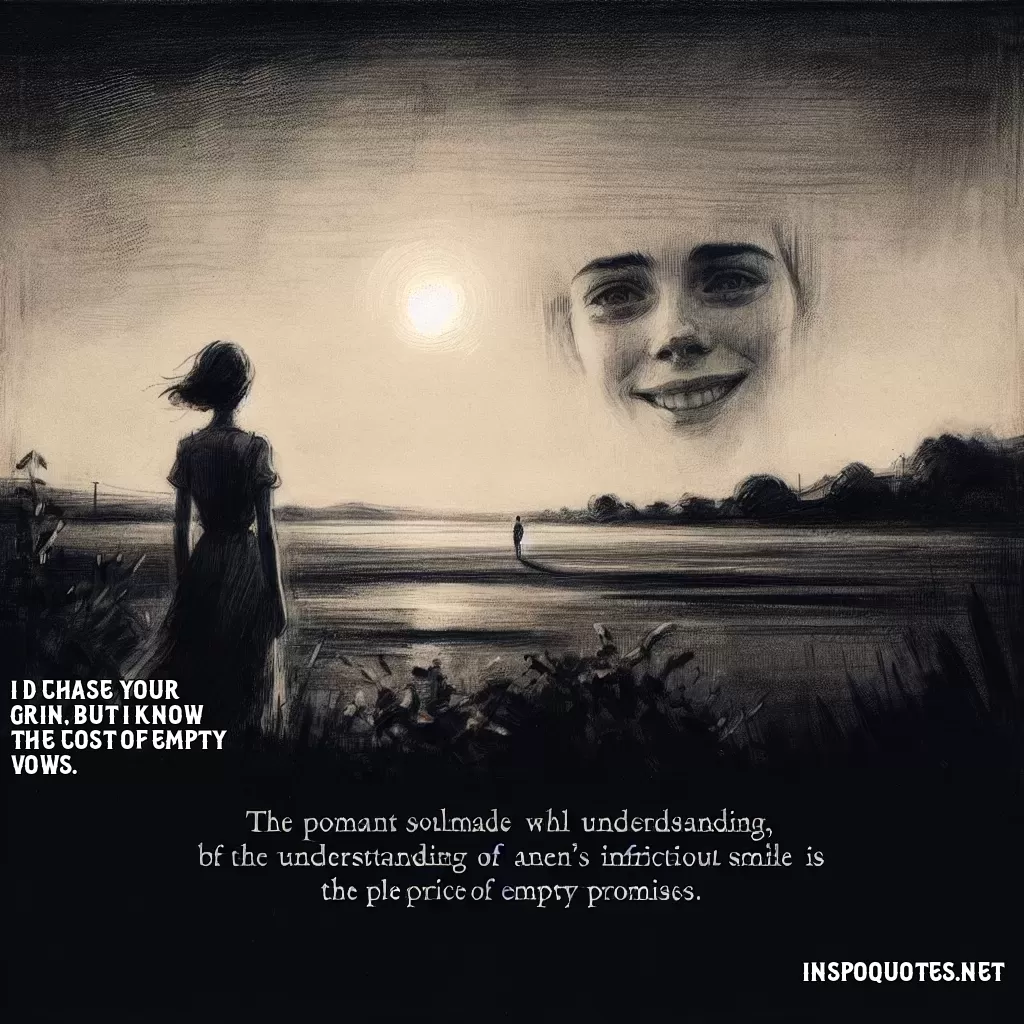
I’d chase your grin, but I know the cost of empty vows.
Author: T. S. Eliot
👁️ 10 views
This quote, "I’d chase your grin, but I know the cost of empty vows," captures the internal conflict between desire and caution, illustrating the speaker's awareness of the emotional risks involved in pursuing superficial or insincere relationships. Here, "I’d chase your grin" suggests an attraction or affection towards someone whose smile or presence is enticing and alluring. It conveys a willingness to pursue that person, driven by the joy or happiness they seemingly radiate. However, the phrase "but I know the cost of empty vows" introduces a note of skepticism or past experience. The "empty vows" likely refer to promises or commitments that were made but not kept, perhaps in a romantic relationship. It suggests a history of disappointment, where the speaker has been let down by assurances that were either insincere from the start or ultimately unfulfilled. Such experiences have taught the speaker about the emotional toll that can result from investing in relationships that are devoid of genuine commitment. In essence, this quote reflects the tension between the longing to be close to someone who brings joy and the protective instinct developed from previous heartache. It is a poignant reminder of the importance of sincerity and trust in relationships. The speaker is torn between the desire to reach for happiness and the wisdom to avoid familiar patterns of emotional pain. This internal struggle is universal, as many people navigate the complexities of relationships by balancing hope and self-preservation, ultimately seeking connections that are both joyous and dependable.
Quote By: T. S. Eliot
**T. S. Eliot: A Literary Luminary**
Thomas Stearns Eliot, known to the literary world as T. S. Eliot, was born on September 26, 1888, in St. Louis, Missouri. An influential poet, essayist, and playwright, Eliot became one of the 20th century's most significant literary figures, known for his innovative approach to poetry and profound explorations of modernity. He was educated at Harvard University, where he earned a bachelor's degree in philosophy before continuing his studies in Paris at the Sorbonne. This fusion of American roots and European intellectualism would greatly influence his work.
Eliot's career began to flourish in the early 1900s when he produced some of his most famous poems, including "The Love Song of J. Alfred Prufrock," published in 1915. This groundbreaking work introduced readers to a new style—fragmented, introspective, and rich with allusions. It was a reflection of the disillusionment prevalent in the aftermath of World War I. Eliot’s ability to convey the anxieties of the modern age resonated deeply with his contemporaries, marking him as a voice of his generation.
In 1922, Eliot published "The Waste Land," a monumental poem that solidified his reputation as a master of modernist literature. The poem’s intricate structure and use of diverse literary references conveyed the chaos and despair of post-war society. Eliot’s innovative technique of blending various voices and perspectives into a single narrative captured the fragmented nature of contemporary life, earning him acclaim as a pioneer of modernist poetry.
Beyond poetry, T. S. Eliot was also a notable playwright and critic. His plays, such as "Murder in the Cathedral" and "The Cocktail Party," explored themes of faith, morality, and existential struggle, further illustrating his intellectual depth. Throughout his life, Eliot remained engaged in literary criticism, using his essays to articulate his vision of literature and the role of the poet in society.
Eliot’s contributions extended beyond his literary works; he was awarded the Nobel Prize in Literature in 1948 for his profound impact on poetry. He continued to write and lecture until his death on January 4, 1965. T. S. Eliot’s legacy endures, as his exploration of the human condition and the complexities of modern life continue to resonate with audiences around the world. His work invites readers to reflect on their own experiences and the broader societal changes around them, establishing him as a timeless figure in literature.